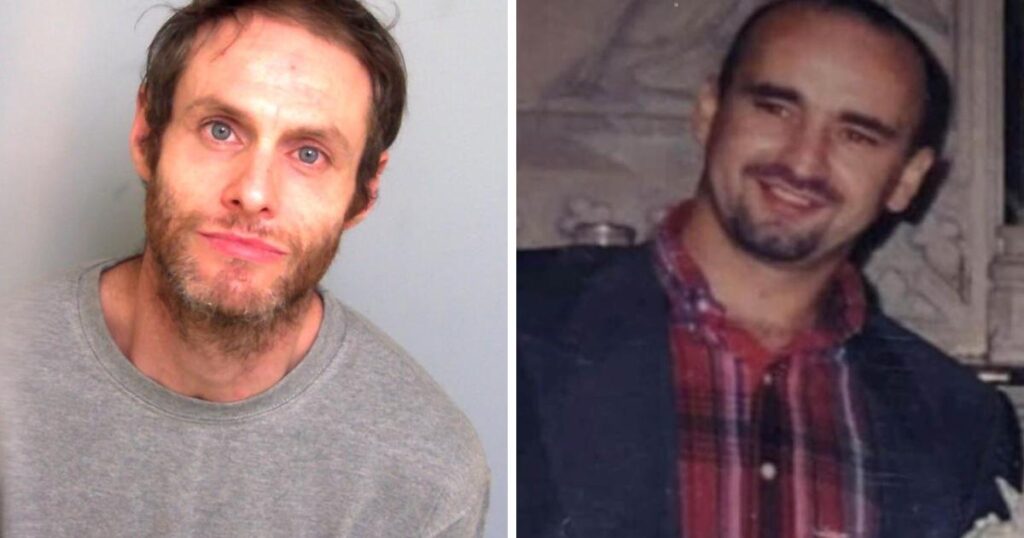63-year-old Francis Reilly visited John Moore, 39, at his flat on Ingrave Road to collect some money he was owed.
Moore is said by Essex Police to have regularly borrowed money to fuel his drug habit and was in debt to Reilly.

Reilly arrived on September 12 with a small bottle of ammonia which, when a fight broke out in the flat, he tried to spray at Moore.
But Moore, stronger and over 20 years younger than Mr Reilly, quickly overpowered Reilly and armed himself with a hammer.
He repeatedly cracked down on Reilly with the weapon and threw him against a wall.
Reilly managed to flee the flat, but Moore’s attack continued outside, in view of a taxi driver.
The taxi driver flagged down two passing police officers, telling them he had just seen a man striking another repeatedly with a hammer as the victim pleaded with his attacker.
The officers raced to the scene, finding Mr Reilly badly wounded and gasping for breath.
Reilly told the officers he had been “hit everywhere”, pointing out the nearby Moore as the person responsible.

The officers called for paramedics, but Reilly died at the scene at 4.25pm.
Mr Reilly was later found to have suffered catastrophic injuries, including multiple injuries to his face, head, arms and chest, many of which were consistent with blows from a hammer.
He also suffered extensive rib fractures and a collapsed lung, consistent with being thrown against a wall with force.
One neighbour told police they heard “someone being thrown around”. He further recognised the voice of Mr Reilly shouting “please stop”.
In the immediate aftermath of the incident, Moore claimed the ammonia had been sprayed extensively into his mouth and eyes, causing him extreme discomfort.
But officers recovered the bottle, finding the majority of the liquid had spilled onto the floor of the flat.
A consultant burns surgeon was tasked with examining medical notes detailing any injuries to Moore, as well as our officers’ body worn video footage showing him at the scene and in hospital.
Moore’s version of events was discounted, with the expert finding that although Moore had been exposed to ammonia, there was no evidence to suggest he had experienced significantly adverse effects to his breathing or sight.
Moore denied murder, instead claiming self-defence, and a trial took place at Basildon Crown Court in August.
Referencing the clear evidence gathered by our detectives, the prosecution told the jury Moore’s actions definitively went beyond any reasonable form of self-defence.
The jury failed to reach a verdict on the murder charge.
Moore admitted manslaughter ahead of a planned re-trial – a plea which was deemed acceptable by all parties.
At the same court on October 13, he was sentenced to six years and two months imprisonment.
In a previous statement, Mr Reilly’s family said: “Frankie was a loving father, brother, grandfather and uncle.
“He was greatly loved by his whole family and will be sadly missed.
“We would ask for privacy so we can continue to grieve as a family.”
Detective Inspector Lisa Hurrell, senior investigating officer, said: “Our case, based on the clear evidence we painstakingly gathered, has always been that Moore was responsible for a determined and brutal assault.
“This sustained attack went far beyond what any reasonable person could call self-defence.
“Whatever Mr Reilly’s motivations for visiting Moore that day, whatever took place between the two men, it was no excuse and no justification for what was to follow.
“Moore told our officers he had been in a ‘life or death’ situation.
“In reality, within moments of his confrontation with Mr Reilly, Moore had turned the tables on him, gaining the upper hand and using that opportunity to exact his revenge.
“He claimed to have suffered mouth and eye injuries as a result of an ammonia attack.
“While it is true Mr Reilly had brought ammonia to the scene, likely with the intention of using it against Moore, there is no evidence that he suffered any significant exposure to this substance.
“Instead, unobstructed and in full control of his actions, he chose to viciously beat Mr Reilly.
“Regardless of the choices he may have made, Mr Reilly had a family and he was loved. He was a father, brother, grandfather and uncle.
“He had loved ones who feel his absence in their lives. Nobody deserves to die in the way he did and it was only right we ensured Moore was unable to get away with his horrific actions that day.”




